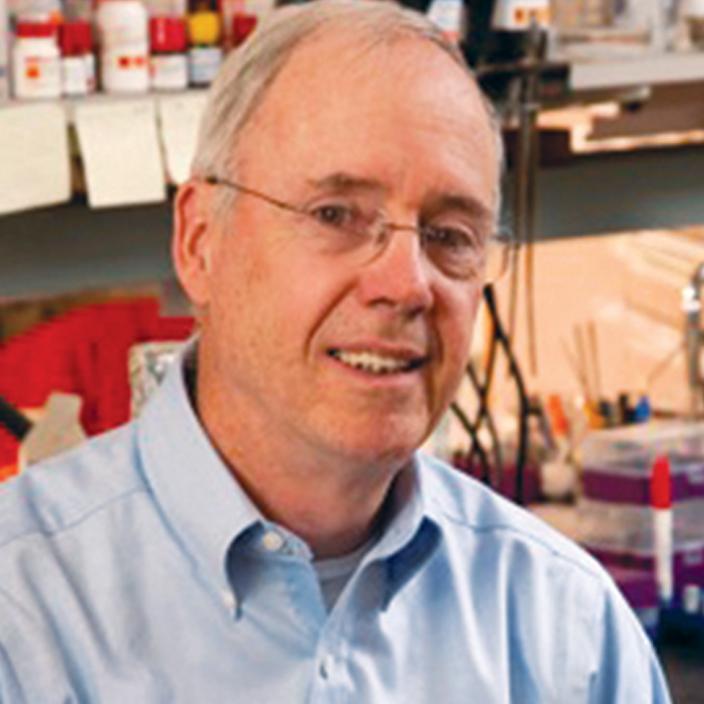
During the past two centuries, as science's tools and techniques have become ever more refined, so have scientists become increasingly focused and specialized in their individual careers. The generalists of the past, the Galileos and Ben Franklins, whose interests and talents ranged across a broad spectrum of knowledge, have little place in a world that demands specialists who can focus narrowly on one field or even on a single scientific problem. But there are notable exceptions—scientists who resist being restricted to defined boundaries between scientific disciplines. Such scientists recognize the principle of what biologist E. O. Wilson calls "consilience"—the essential, ultimate unity and commonality of all fields of knowledge. One such scientist is Christopher Walsh, who has spent his life working at the interface of biology, chemistry, and medicine.
After earning his Ph.D. at The Rockefeller University, Walsh began his career as a post-doc at Brandeis University. He worked under Robert Abeles, with whom he studied enzymology, specifically the mechanisms of enzyme inhibition. He took a position at MIT in 1972, where he extended his work on enzymes to investigate "suicide substrates," a special class of enzyme inhibitors. These, along with other enzyme-inhibiting mechanisms he developed, were instrumental in the creation of new and useful drugs. He also studied and elucidated previously unknown enzymatic transformations such as flavin-dependent redox active cofactors. In all of this work, Walsh was approaching the study of biological mechanisms through a chemistry-tinted lens, laying the groundwork for the new discipline of chemical biology.
In 1987, after five years as chair of the MIT Chemistry Department, Walsh took on a new position with a title indicative of the broad-ranging character of his work: chair of the Department of Biological Chemistry and Molecular Pharmacology at Harvard Medical School. He built on his earlier research on enzymatic processes to look at the workings of antibiotics and anti-tumor drugs, exploring ways to combat the ever-growing problem of antibiotic and drug resistance. When other drugs fail to stop life-threatening bacterial infections such as MRSA, the traditional last resort has been vancomycin, despite its dangerous side effects and toxicity. In recent years, even this powerful pharmaceutical weapon has been compromised by increasing bacterial resistance. Probing into the new anti-drug defenses evolved by bacteria, Walsh found that five different genes were needed to create vancomycin resistance, and isolated and characterized all of them. This new understanding promises the development of a new family of vancomycin derivatives that can overwhelm the newly-resistant bacterial strains.
Walsh has continued to perform vitally important research on the action, resistance mechanisms, and biosynthesis of antibiotics, including the identification of the non-ribosomal peptide synthase (NRPS) and polyketide synthase (PKS) pathways through which biologically active small molecules are formed. Such knowledge is crucial both for the improvement and refinement of existing drugs, but also for the synthesis of new pharmaceuticals with enhanced, better-targeted therapeutic characteristics.
Walsh has served as president and CEO of the Dana Farber Cancer Institute (1992-1995), as a member of the Scientific Review Board of HHMI and the National Academy of Sciences, among many other prestigious organizations, and as a consultant to major pharmaceutical companies. He is now Hamilton Kuhn Distinguished Professor at Harvard Medical School. Walsh’s first book, Enzymatic Reaction Mechanisms, published in 1979, is widely recognized as a classic in its field, as are his two succeeding volumes. He has published more than 800 papers and he has trained a whole new generation of chemical biologists.
From its beginning to the present day, Christopher Walsh's career has been about bringing together disparate pieces of knowledge from different and sometimes unexpected sources—and how, much as the enzymatic mechanisms he studies, new and important reactions are created in the process. Walsh himself has made perhaps the most apt observation of his own scientific impact: "As befits an enzymologist, my contributions have been catalytic."
Information as of April 2014

